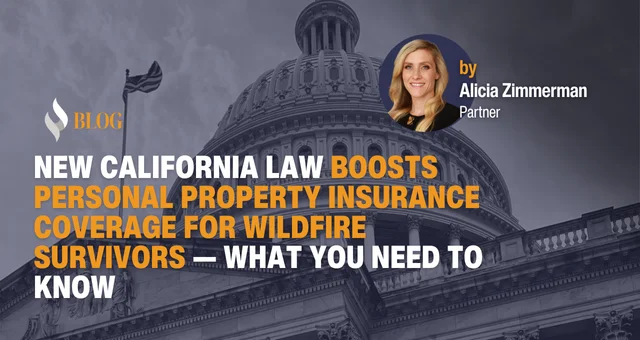
The devastating wildfires that swept through Southern California in January 2025 left thousands of homeowners facing the difficult task of recovering and rebuilding. One of the biggest challenges for many survivors is recovering the value of what was lost inside their homes — furniture, clothing, electronics, and other personal belongings.
Recent developments in California law and insurance regulation directly affect how these personal property claims are handled. A formal request from the Insurance Commissioner earlier this year and a new law signed by Governor Gavin Newsom in October both aim to make it easier for wildfire survivors to receive full compensation.
Insurance Commissioner’s Request: What It Means and What It Doesn’t
In February 2025, Insurance Commissioner Ricardo Lara issued a request to all residential property insurers handling wildfire claims. He requested all insurance companies offer 100%--but no less than 75%—of the personal property coverage limits to policyholders who suffered a total loss — without requiring a detailed personal property inventory.
The Commissioner’s reasoning was simple: after losing everything, few homeowners can realistically itemize every possession they owned.
However, this request was not a change in the law. Under Insurance Code Section 10103.7(b), insurers are required to pay only 30% of the personal property coverage limit (up to $250,000) without an inventory for total losses during a declared state of emergency. Some insurers voluntarily went beyond that minimum; the Commissioner’s letter was an effort to push the rest to do the same.
New Law Signed by Governor Newsom: Expanding Mandatory Coverage Payments in 2026
On October 13, 2025, Governor Gavin Newsom signed into law a major update to California’s wildfire insurance protections—effective beginning January 1, 2026—raising the minimum amount insurers must pay wildfire victims who lose their home for personal property claims without an inventory from 30% to 60% (or $250,000 to $350,000).
This law expands the coverage homeowners can expect under the existing legal framework and strengthens the state’s commitment to helping wildfire survivors recover more quickly.
What Should Victims of Future Wildfires Do?
- Review your insurance policy carefully to understand your coverage limits and rights.
- Document your losses as best as you can, but know that under the new law, inventories will not be required to receive 60% of your personal property coverage.
- Contact your insurance company or adjuster for claim guidance.
- If you encounter difficulties or your insurer is unwilling to provide the required coverage, consult with an experienced insurance attorney.
- Stay informed about any further legislative or regulatory developments.
It’s important to note that the February 2025 Commissioner’s notice was an important call to action for insurers but did not create a legal requirement. The recent law signed by Governor Newsom, however, changes the legal obligations of insurance companies—beginning January 1, 2026—to provide increased personal property coverage without inventories to wildfire victims.
Understanding this distinction is key to knowing what you can expect and demand from your insurance provider.
Singleton Schreiber is Here to Help
We understand the physical, emotional, and financial toll wildfire survivors endure during recovery. At Singleton Schreiber, we’re committed to standing by your side, helping you understand your insurance rights, and advocating for fair treatment.
If you or someone you know has a wildfire-related insurance claim, especially regarding personal property losses, please reach out. We’re here to support you every step of the way.
- Partner
Alicia Zimmerman is a partner in Singleton Schreiber’s San Diego office and leads our Fire Litigation practice group, where she oversees a team of more than 100 employees.
Ms. Zimmerman is an experienced litigator, well-versed in ...

